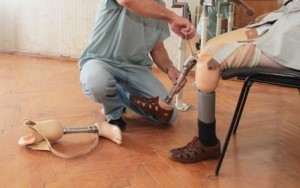Continued improvements in prosthetic limbs will benefit amputees injured in Michigan auto accidents
As personal injury lawyers, we want our clients to recover from their injuries and losses to the greatest extent possible, above all else. That’s why we get so excited when we  hear about inventions and technological advancements that will improve the lives of those who suffer catastrophic injury. This is especially true in our line of work, particularly with auto accident survivors. Inventors and designers are working hard to create high-functioning prosthetics for amputees. Pioneers are leading the way in improving the quality of life for amputees everywhere, including those injured as a result of car, semi-truck, or motorcycle accidents.
hear about inventions and technological advancements that will improve the lives of those who suffer catastrophic injury. This is especially true in our line of work, particularly with auto accident survivors. Inventors and designers are working hard to create high-functioning prosthetics for amputees. Pioneers are leading the way in improving the quality of life for amputees everywhere, including those injured as a result of car, semi-truck, or motorcycle accidents.
Fortunately, in Michigan we celebrate innovators such as Hugh Herr, the keynote speaker at this year’s West Michigan Design Week who was injured in a mountain climbing accident resulting in the loss of both of his legs above the knee. Herr is an associate professor at MIT and the director of The Herr Institute for Human Rehabilitation; his laboratory has outfitted more than one thousand amputees with high-tech prosthetic legs. In fact, his bio-mechanical legs allow him to “walk, run, and jump” and are powered by a “complicated network of battery-powered sensors and motors.” Among his remarks at West Michigan Design Week was that he believed that there was a disability-free future ahead.
In the many discussions surrounding Michigan no-fault, it seems as though the conversation has moved away from those who have truly benefited from the most generous, comprehensive automobile insurance system in the country: the severely and catastrophically injured. Our no-fault system provides those who will probably need medical attention and rehabilitative care for the remainder of their lives peace of mind, knowing that their treatment will not bankrupt them – as long as their insurance providers keep up their end of the bargain.
Over time, it has been our experience that, in addition to pursuing a liability claim against the at-fault driver (the one whose negligence resulted in the crash), we also help amputees who have had to fight their own insurance providers for payment of the prosthetics they need. Remember, according to the Michigan No-Fault Insurance Act, insurance companies are required to pay for “All reasonable charges incurred for reasonably necessary products, services[,] and accommodations for an injured person’s care, recovery[,] or rehabilitation.” This includes charges for reasonably necessary hospital expenses, physician charges, prescriptions, medical equipment, prosthetic devices, chiropractic treatment, psychological services, in-home care, and other related expenses.” [Emphasis added].
The costs of prosthetic devices can vary dramatically – the more technologically advanced the device, the more it can cost. However, if the device will give an amputee the ability to be more active, more independent, and require less care, as opposed to its cheaper (and potentially low-tech and lower quality) cousin, isn’t it reasonable that an insurance company cover the full cost of a prosthetic device that would place a patient closer to their pre-accident, pre-injury functioning?
